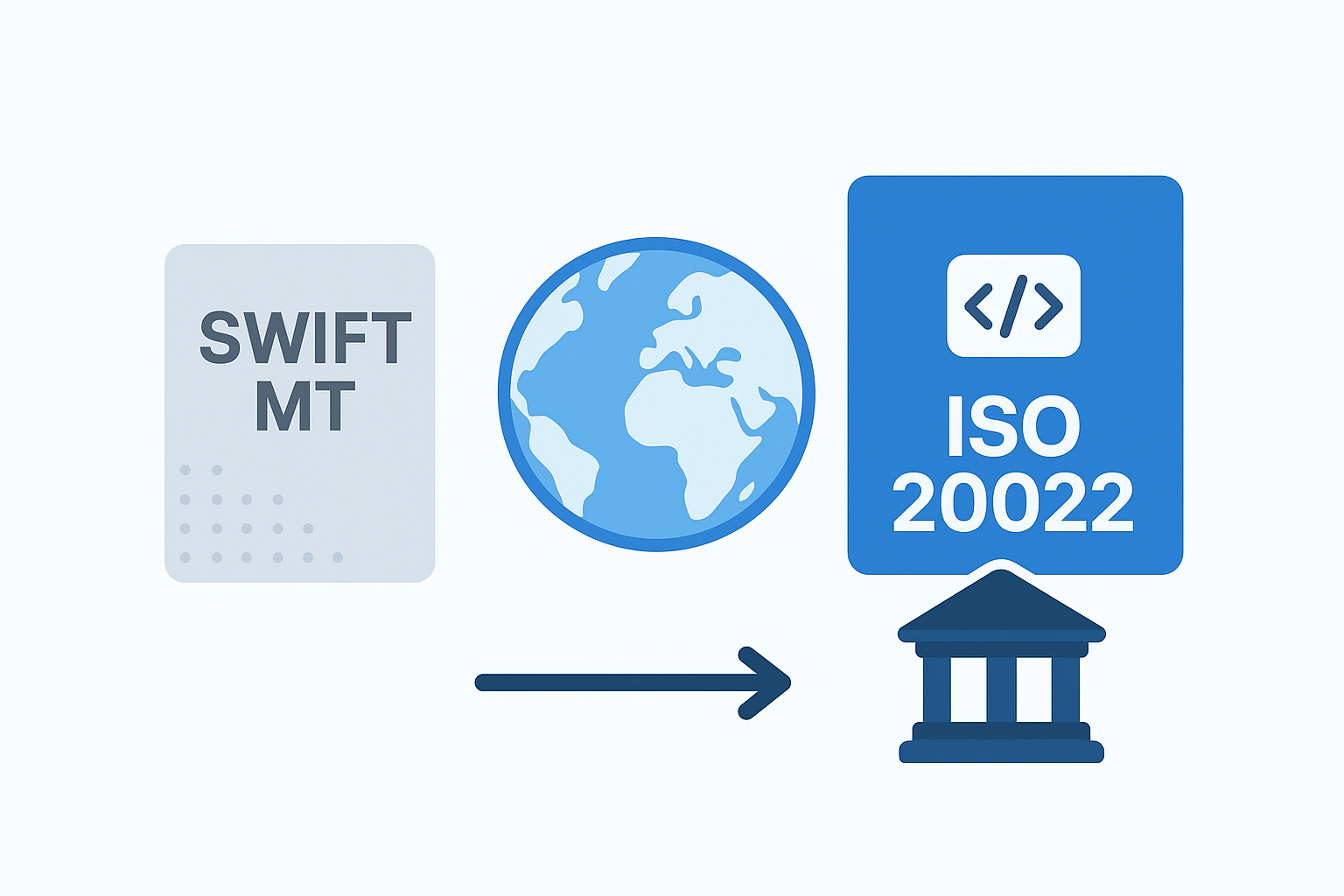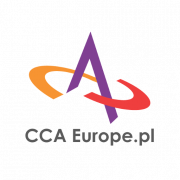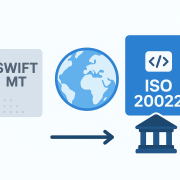ISO 20022: the transition period for SWIFT cross-border payments is ending

ISO 20022 is a global data exchange standard for payments that is gradually replacing the old SWIFT MT messages. It will become mandatory for cross-border transfers in the SWIFT system from November 2025, and will also cover SEPA and Elixir in the following years. Find out what happens if a bank decides not to implement the changes.
What is ISO 20022 and why was it created?
ISO 20022 is a universal format for financial messages. It is based on XML and allows for the transfer of much richer and better-structured data than previous standards. The shift to ISO 20022 can be compared to moving from a simple, telegraphic language to a precise and detailed description.
The old formats, such as SWIFT MT, were developed in the 1970s. They had fixed fields with limited size, which made it difficult to add new information. Changing regulations (e.g., anti-money laundering – AML) and growing business needs meant that the financial industry required a new solution.
ISO 20022 migration: how to avoid the testing cost spiral?
Benefits of ISO 20022
Implementing the new standard brings a range of benefits, positively impacting the efficiency and security of financial operations:
Structured data
ISO 20022 messages allow the transmission of precise and well-organized information about the payer, the recipient, and the payment itself. All important details—such as addresses, dates, invoice identifiers, or payment purpose codes—are placed in the correct fields. This reduces the risk of errors caused by manual data entry.
Greater automation
With complete and structured data, computer systems can process transactions automatically. Banks and companies can reconcile payments, manage cash, and maintain accounting records automatically. This reduces costs and speeds up payment processing.
Improved regulatory compliance
The new standard helps meet requirements such as AML and KYC (Know Your Customer). Banks receive more detailed data, which facilitates the identification of beneficiaries and helps monitor transactions for potential risks.
Compatibility and global reach
ISO 20022 is universal. It simplifies communication between different systems and countries, eliminating the need for multiple local standards, which reduces complexity and integration costs.
Who is affected by ISO 20022?
The migration to ISO 20022 impacts all participants in the payment system:
Banks and Financial Institutions: They are the main beneficiaries. But they need to prepare their systems for the new standard—updating infrastructure, software, and operational procedures.
Companies and Corporations: They will transmit more data in their payments, including full addresses and identifiers. Their financial and accounting systems (e.g., ERP) must be ready to send and receive ISO 20022 messages.
Individual Customers: For them, the change will be almost unnoticeable, but it will make payments faster and safer—for example, international transfers will arrive more quickly.
Regulators and Supervisory Authorities: They will have better visibility over money flows, making it easier to monitor transactions and combat financial crime.
ISO 20022 implementation schedule
Migration is a gradual process. Each payment system has its own timeline:
- 2023: The TARGET2 system in the Eurozone migrated to ISO 20022, marking the start of the transition period.
- September 2025: Poland’s high-value payment system, SORBNET, is scheduled to switch exclusively to ISO 20022.
- November 2025: The transition period for SWIFT cross-border payments ends. From this point, banks will fully adopt the new format, and the MT standard will no longer be supported for cross-border transactions.
- November 2026: The new standard will become mandatory for SEPA transfers (Credit Transfer and Instant).
- 2026 and beyond: Poland’s ELIXIR system, which handles domestic transfers in PLN, is expected to migrate to ISO 20022.
What if a bank fails to implement ISO 20022 on time?
Failure to implement ISO 20022 on schedule poses a serious risk. A bank that does not upgrade its systems may eventually be unable to send or receive payments in key systems. Companies and customers could face delays, or in the worst case, transaction rejections.
There are temporary solutions that allow banks to operate during the transition period:
- SWIFT In-Flow Translation: SWIFT offers a service that translates MX messages to MT and vice versa. This is an emergency solution that enables banks to communicate at different stages of the migration. However, it carries the risk of losing detailed data (truncation), which may negatively impact AML and screening processes. It can also be chargeable and may become more expensive over time.
- Bank- or Vendor-Side Translator: Banks can use their own converter or an external vendor solution. This reduces time pressure but incurs additional license, implementation, and maintenance costs. Such a solution acts as a “bridge” and is not a full system upgrade.
- Correspondent Bank Handling: A bank can outsource the conversion and formatting of messages to a partner bank that already supports ISO 20022. This involves extra fees and dependence on an external entity.
These solutions do not exempt banks from the obligation to fully implement ISO 20022.
ISO 20022 delay: a stitch in time saves nine
SWIFT Fees
The MT-to-ISO 20022 conversion service is a short-term contingency plan and carries a monthly fee. The total cost per BIC depends on the Global Tier, and the monthly fee depends on the number of messages transmitted.
The cost is confidential and can be accessed by logging into the SWIFT portal. S wift will start charging from January 2026. The fees are charged at the level of the sending 8- character BIC on a monthly basis.
If the bank sends more than 15,000 MT messages per month (volume exceeds band 5), it needs to contact ther SWIFT client manager for details on service usage and pricing. Fees are not included in Fixed Fee or SWIFT Essentials tariffs and will be reviewed regularly.
To avoid fees, banks must complete the migration to ISO 20022 on time. They must not send FIN/MT messages for cross-border interbank payments after November 2025.
These solutions are only emergency support and do not replace a full upgrade. The full benefits of ISO 20022 can only be realized through a native implementation of the new standard. Banks that fail to act on time risk operational delays, reputational damage, and additional costs. For companies aiming to fully leverage the new standard, we offer support in adapting to ISO 20022

